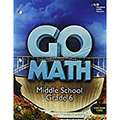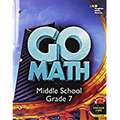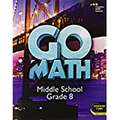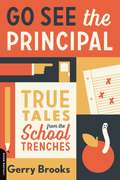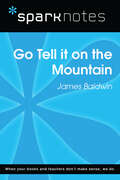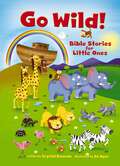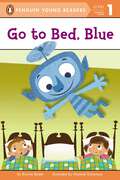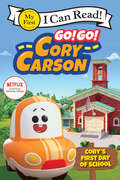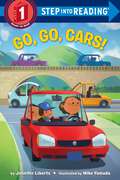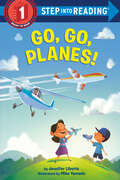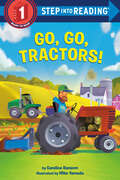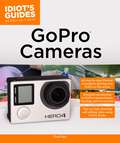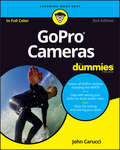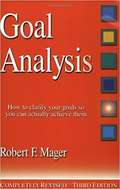- Table View
- List View
Go Math, Middle School, Grade 6
by Timothy D. Kanold Edward B. Burger Juli K. DixonNIMAC-sourced textbook
Go Math, Middle School, Grade 7
by Timothy D. Kanold Edward B. Burger Juli K. DixonNIMAC-sourced textbook
Go Math, Middle School, Grade 8
by Timothy D. Kanold Edward B. Burger Juli K. DixonNIMAC-sourced textbook
Go Math: Middle School, Grade 7
by Timothy D. Kanold Edward B. Burger Juli K. Dixon Steven J. Leinwand Matthew R. Larson Martha E. Sandoval-MartinezThis textbook for 7th graders covers essential math topics, with study guide reviews and assessments.
Go See the Principal: True Tales from the School Trenches
by Gerry BrooksFrom an elementary school principal and popular YouTube personality, inspiration and humor for educators to tackle the challenges they face day-in and day-outGerry Brooks is an elementary school principal turned YouTube celebrity who entertains K-12 teachers, administrators, and parents across the country. He tells jokes with the kind of mocking humor that gets a laugh, yet can be safely shared in school. After all, even great schools have bad days -- when lesson plans fall through, disgruntled parents complain, kids throw temper tantrums because they have to use the same spoon for their applesauce and mashed potatoes, and of course, dealing with...The Horror! The Horror!...dreaded assessments. Ranging from practical topics like social media use in the classroom and parent-teacher conferences to more lighthearted sections such as "Pickup and Dropoff: An Exercise in Humanity" and "School Supplies: Yes, We Really Need All That Stuff," Go See the Principal offers comic relief, inspiration, and advice to those who need it the most.
Go Set a Watchman Teaching Guide: Teaching Guide and Sample Chapters
by Harper Lee Amy JurskisWritten in the 1950s but unpublished until recently, Go Set a Watchman is neither a prequel nor a sequel to To Kill a Mockingbird, and attempting to read it as a simple continuation of the story does not do the work justice. As the adult Jean Louise, "Scout," returns to Macomb to visit Atticus, Go Set a Watchman perfectly captures a young woman, and a world, in painful yet necessary transition out of the illusions of the past—a journey that can only be guided by one’s own conscience. While many characters appear in both novels, some significant characters, like Boo Radley and Hank Clinton, exist in only one of the texts. Go Set a Watchman is also strikingly different in style and tone. Thematically complex and highly allusive, it is a novel that demands active and close reading.This ebook contains sample chapters from Go Set a Watchman and a teaching guide to help educators lead their students through an exploration of the themes, structure, and allusive references in Go Set a Watchman. Questions in the Guided Reading and Discussion section will help highlight the development of plot, character, and theme. Because the text features allusions that students are likely to be unfamiliar with, the guide also includes an index of annotated allusions to help facilitate close reading. Prompts for Writing and Research provide topics for longer writing tasks or research projects. Finally, this guide features an additional section that explores the writer’s craft by looking at both To Kill a Mockingbird and Go Set a Watchman.
Go Tell It on the Mountain (SparkNotes Literature Guide Series)
by SparkNotesGo Tell It on the Mountain (SparkNotes Literature Guide) by James Baldwin Making the reading experience fun! Created by Harvard students for students everywhere, SparkNotes is a new breed of study guide: smarter, better, faster.Geared to what today's students need to know, SparkNotes provides:chapter-by-chapter analysis explanations of key themes, motifs, and symbols a review quiz and essay topics Lively and accessible, these guides are perfect for late-night studying and writing papers.
Go Wild! Bible Stories for Little Ones
by Crystal BowmanGod told Noah, &“Build a boat,long and wide so it will float.&”Two by two the creatures came.Some were wild, some were tame.Get little ones excited about the stories of the Bible with Go Wild! Bible Stories for Little Ones. Children will love reading through the eight beloved stories from the Old and New Testaments, including Noah&’s Ark, Daniel and the Lions&’ Den, and The Lost Sheep. At the end of each story is an activity encouraging readers to &“Go Wild&” and flap their arms like a bird or roar like a lion. So have fun with this padded cover board book and go explore the wonders of the Bible!
Go to Bed, Blue (Penguin Young Readers, Level 1)
by Bonnie BaderDid you know that even aliens have a hard time going to bed?Blue, an alien from outer space, may make a great friend, but he’s not very good at going to bed. It takes patience and some bedtime tricks to get this alien to settle down! Written in the style of Dick and Jane, this 32-page, Level 1 reader is simple, fun, and rich with picture clues.
Go to Sleep!: Independent Reading Yellow 3 (Reading Champion #620)
by Damian HarveyThis story is part of Reading Champion, a series carefully linked to book bands to encourage independent reading skills, developed with Dr Sue Bodman and Glen Franklin of UCL Institute of Education (IOE)Reading Champion offers independent reading books for children to practise and reinforce their developing reading skills.Fantastic, original stories are accompanied by engaging artwork and a reading activity. Each book has been carefully graded so that it can be matched to a child's reading ability, encouraging reading for pleasure.
Go! Go! Cory Carson: Cookies (My First I Can Read)
by NetflixBased on the Netflix original series, this early reader is perfect for any Go! Go! Cory Carson fan! When the Police Chief leaves Chrissy in charge of the cookie table, Chrissy transforms into: Officer Chrissy!Go! Go! Cory Carson features Cory, a little kid car with an engine that runs on fun! Cory and his family live in the town of Bumperton Hills, a charming neighborhood filled with characters of all different makes and models. While navigating the winding roads of childhood, Cory’s eager and playful spirit sometimes veers him off course. Luckily his friends and family are always there to get Cory back on track!
Go! Go! Cory Carson: Cory's First Day of School (My First I Can Read)
by NetflixBased on the Netflix original series, this early reader is perfect for any Go! Go! Cory Carson fan! Cory is excited to meet new friends at his first day of school. But when mom drops him off, Cory feels nervous. Go! Go! Cory Carson features Cory, a little kid car with an engine that runs on fun! Cory and his family live in the town of Bumperton Hills, a charming neighborhood filled with characters of all different makes and models. While navigating the winding roads of childhood, Cory’s eager and playful spirit sometimes veers him off course. Luckily his friends and family are always there to get Cory back on track!
Go, Cub! (National Geographic Kids Readers)
by Susan B. NeumanJoin the little lion cub on his day of adventures on the African savanna. Watch him run, jump, play, eat, and sleep, cuddle with mom, and roll around with his brother and sister. Told in simple yet lively text built with sight words and using picture icons to aid reading, National Geographic Pre-readers will enchant kids just beginning their journey with books.
Go, Dog. Go!: Omnibus Edition (Beginner Books(R))
by P.D. EastmanReading goes to the dogs in this timeless Beginner Book edited by Dr. Seuss. From big dogs and little dogs to red, green, and blue dogs, dogs going up and dogs going fast . . . who knew dogs were so busy? And laughter will ensue at the repeated question &“Do you like my hat?&” Like P. D. Eastman&’s classic Are You My Mother? Go, Dog. Go! has been a go-to favorite for over fifty years, leaving audiences of all breeds wagging their tails with delight. Originally created by Dr. Seuss, Beginner Books encourage children to read all by themselves, with simple words and illustrations that give clues to their meaning. "The canine cartoons make an elementary text funny and coherent and still one of the best around."--School Library Journal.
Go, Girl, Go! (Cheer USA #1)
by Jeanne BetancourtThis new cheerleading series starts with seventh-grade tryouts at Claymore Middle School in Florida. Not everyone in the incoming class will make the team, but four fiercely determined girls will give it their 150 percent best.
Go, Go, Cars! (Step into Reading)
by Jennifer LibertsA simple, rhyming Step 1 Reader featuring all kinds of cars!A brother and sister discover all kinds of cars as they travel through their own neighborhood, encounter a parade, visit a car wash, and more! Young vehicle enthusiasts will take pride in cruising through the simple, rhyming text. Bright, bouncy art will help them along the reading journey! Step 1 Readers feature big type and easy words for children who know the alphabet and are eager to begin reading. Rhyme and rhythmic text paired with picture clues help children decode the story.
Go, Go, Go! (Step into Reading)
by Melissa LagonegroLightning McQueen, Mater, Sally, and the rest of the gang from Disney/Pixar's Cars are back! This super-simple Step 1 reader is perfect for children who love cars, trucks, trains, planes, and everything that goes.
Go, Go, Monster Trucks!: A First Book of Trucks for Toddlers (Go, Go Books)
by Bonnie Rickner JensenVibrant paint jobs. Roaring engines. Tremendous power!—a monster trucks book for toddlersFew things can stimulate a child's imagination like a spectacularly painted, gigantic truck flying through the air! Go, Go, Monster Trucks! will captivate your toddler with tons of incredible photographs and fun facts that give your child a glimpse into the world of these incredible vehicles.From the design of the most famous monster trucks to what the drivers wear, this book takes toddlers along for the ride with a fun and clever rhyming verse that makes their learning experience even more exciting. Introduce your little one to these powerful machines and watch their interest soar!Go, Go, Monster Trucks! includes:A-listers—They'll be introduced to the likes of Grave Digger, Avenger, Swamp Thing, and others.Simple read—The age-appropriate rhyming verse makes it simple for your toddler to follow along from beginning to end.Eye-popping images—Vivid photographs of monster trucks give your toddler an up-close and personal view of these powerful, four-wheeled monster trucks.This engaging monster truck book is sure to delight and entertain your toddler!
Go, Go, Planes! (Step into Reading)
by Jennifer LibertsA simple, rhyming Step 1 Reader about planes is a companion to Go, Go, Trucks! and Go, Go, Cars! and Go, Go Tractors!A brother and sister discover all kinds of planes, from jumbo jets to toy planes, to small planes flying overhead! Young flight enthusiasts will take pride in cruising through the easy-to-read text. Bright, bouncy art will support word recognition along their journey to reading success!Step 1 Readers feature big type and easy words for children who know the alphabet and are eager to begin reading. Rhyme and rhythmic text paired with picture clues help children decode the story.
Go, Go, Tractors! (Step into Reading)
by Candice Ransom Mike YamadaA rollicking, rhyming early reader about all kinds of tractors!The team that brought you Go, Go, Cars! and Go, Go, Trucks! returns with the same vehicle-loving brother and sister duo discovering all kinds of tractors as they travel along country roads, go to the dump, and visit a farm! Young vehicle-enthusiasts will take pride in cruising through the simple, decodable text. Bright, bouncy art will help readers along the reading journey! Step 1 Readers feature big type and easy words for children who know the alphabet and are eager to begin reading. Rhyme and rhythmic text paired picture clues help children decode the story.
Go, Popplio! (Pokémon: Scholastic Reader, Level 2)
by Maria S. BarboKids can practice their reading skills with Pokémon in this fun Level 2 Reader!Join Ash and Pikachu on an adventure in the Alola region!Ash and his friends are on a fishing field trip. But—uh-oh—Team Rocket wants to steal their Pokémon! It’s up to Popplio to save the Pokémon—and the day.This Level 2 reader is based on an episode from the hit Pokemon animated series. Full-color illustrations throughout!
Go-To-Guide for Social Skills
by Joyce A. OlsonThis go-to guide is a valuable tool for teachers and parents of children with challenging behaviors. It details step-by-step instructions for writing a solid IEP (Individual Education Plan), a FBA (Functional Behavior Assessment) and a BIP (Behavior Intervention Plan). It also gives suggestions for alternative behaviors and how to incorporate those behaviors into the child's behavior routine. There is a very simple but effective Anger Management program for children of school age.
GoPro Cameras (Idiot's Guides)
by Chad FahsPeople love to capture their lives in colorful shots and movies they can place on YouTube, Facebook, or their own websites. Rugged and lightweight, GoPro cameras empower their users by providing powerful technology to tell stories that strike the right balance of words and pictures. These high-tech cameras enable users to capture powerful images—whether it&’s the miraculous beauty of a shark swimming by a coral reef or a motocross biker flying. However, users can&’t just thrust this camera underwater or attach it to a bike and hope for the best. They need to understand the basics about how to correctly operate, mount, and care for this camera in all types of environments. It's crucial to learn the camera&’s capabilities before they start spending serious cash on accessories and actually using it. The full-color illustrated Idiot&’s Guides®: GoPro Cameras covers: - The fundamental basics of the GoPro and understanding your personal expertise. - Familiarizing yourself with your camera and understanding lighting in differing environments (land, air, sea). - The pros and cons of getting it wet. - Mounting the camera to an object or mounting it to your person for shoots. - Accessorizing with specialty mounts, differing housing, electronic additions, and additional items like fog filters. - Knowing how to frame and photograph great shots and capture action. - 40 step-by-step projects utilizing your GoPro camera to capture your favorite active sports (such as biking, basketball, archery, etc.), in addition to engaging home life events (such as pet antics, nature, childplay, etc.)
GoPro Cameras For Dummies
by John CarucciYou only get one chance to take the perfect action shot The GoPro camera has taken the market by storm. Durable andweatherproof, these cameras are tailor-made for athletes,filmmakers, journalists, and hobbyists who want a hands-freedevice. Whether you're BASE-jumping, mountain biking, surfing, orjust shooting the next big indie masterpiece, GoPro Cameras ForDummies has you covered with information on how to get the bestphotos and videos from your camera.Jumpstart your GoPro experience, with helpful advice on how tocreate and share action-packed photos and videos. Plus you'll getprofessional insight on how to mount, set, and control your camerafor best results no matter the shooting conditions, and how toedit, add music, and share your finished piece. Step-by-stepinstructions walk you through each process, helping you getacquainted with the GoPro's controls and settings until you'reconsistently getting great footage. This helpful guide is packedwith full-color, full-page examples of GoPro photos from top users,to inspire you to get the most from your new camera.Choose the right camera and add the right accessoriesMaster the settings for any environmentEstablish framing, work with lighting, and capture soundEdit your images, and put them together as a projectRather than risk bad results with the school of trial by error,master your camera with the help of a professional photographer andvideographer. The best action shots can't be re-created, so knowwhat you're doing going in so you can nail that shot the firsttime. If you're ready to get out there and start shooting, grabyour gear and grab GoPro Cameras For Dummies, your personalGoPro coach.
Goal Analysis: How to Clarify Your Goals So You Can Actually Achieve Them
by Robert MagerTo achieve useful goals, those goals must be translated into specific, observable, desired performances. The new and completely revised Third Edition of Goal Analysis gives you a concise, simple, step-by-step process for doing so. It shows you how to: Discover the meaning of vaguely stated goals, decide what steps are appropriate for achieving those goals, and recognize and demonstrate achievement of your goals. This revised Third Edition includes four new chapters, over 50 practice exercises to sharpen your skills, a dozen diagrams and graphs to help you understand the process and a new index for easy reference. You'll find this technique so useful that you'll use it not only with colleagues, managers and students, but with friends and family as well.
